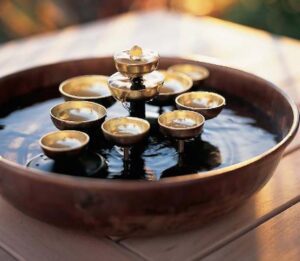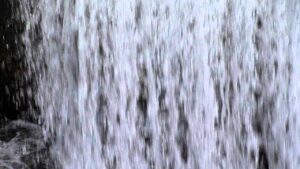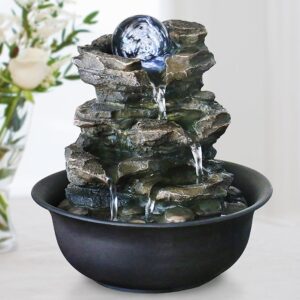Feng Shui Fountains Applications
Water fountains are used in feng shui adjustments because they bring in the water element. But what does that mean? Read on to learn how and why to use water feng shui fountains.
First, a fountain can help to create a peaceful and harmonious environment. The sound of trickling water is very soothing and can help you relax any tension or stress you may be holding onto.
Fountains also invite the water element into your space, helping activate water element qualities in your life. Water can be deep and still, like a lake, or flowing and changeable, like a river. The deep aspects of water are connected to wisdom, insight, and intuition, while the more flowing side of water represents our social connections and how we interact with the world around us. Because of this, you may want to add more water to your space if you’d like to invite wisdom and depth or if you’d like to expand your social network.
Water, especially flowing water, is also related to wealth, abundance, and cash flow. You may already be familiar with fountains being used for this purpose, which can be pretty effective. If you are using a fountain to invite wealth and prosperity, there are a few areas of your home where it might be most effective — we’ll come back to this in a moment.
The constant water movement in a fountain can also help stir up the qi in your home. One of the main goals of feng shui is to adjust the flow of qi in a space, which includes making sure that it can move freely. Qi that is not flowing becomes stale or stagnant, and when this happens, we can become stuck in areas of our lives as well.
Where to Put Feng Shui Fountains
Fountains can help Kan (Career) area of the feng shui Bagua map because it is related to the water element. Wisdom and knowledge and networking and social connections are both water qualities and vital for career success. Placing an item pertaining to the water element, like a fountain, can boost these qualities in your career.
Additionally, you may want to place a fountain in one of the feng shui areas associated with the wood element since water feeds wood. We can see this in nature; plants and trees need water to grow and thrive. Xun (wealth and abundance) area of the Bagua and the Zhen (family and new beginnings) area are both related to the wood element. If you’d like to support one of these areas of your life, it can help place a water fountain in the corresponding area.
Near the entrance of a home is also a great place for a fountain if you want to encourage wealth and cash flow. The front entrance is also called the mouth of qi because it is where energy and opportunities enter our homes and our lives. Ideally, the water should flow up and then down. If the water flows in one direction, it should be flowing towards the inside of the home to encourage money to flow rather than out.
Different Types of Feng Shui Fountains
There are a few different things to consider when it comes to which fountain to choose. You may want to view the material it’s made of and how it relates to the five elements. A metal fountain, such as one made of stainless steel or copper, is a great choice if you’d like to bring more metal element qualities into your space, like precision, organization, and joy. If you’d like more stability or grounding, you may want to invite more earth energy into your home; if this is the case, look for a fountain made of stone or ceramic.
Fountains also come in many shapes and sizes. There are feng shui fountains that sit on the floor, which can be quite tall. You can also get feng shui fountains that hang on the wall. If you do get one of these, make sure you have it installed professionally since it can be quite heavy. The easiest kind of fountain to incorporate into a home is a tabletop fountain, which you can place on a table, shelf, or other horizontal surfaces.
The most important thing to keep in mind is to choose a fountain that you love. Look for something that goes with your style and decor preferences, so it will be a source of joy when you see it in your home.
Feng Shui Fountains Upkeep
It’s important to maintain your water feng shui fountain and keep it clean. Feng shui fountains with algae, slime, or dirty water are not beneficial for inviting positive, healthy qi into your home. It’s usually best to use distilled water. It is because tap water often has minerals in it that create deposits on your fountain and clog the pump.
If you do notice any deposits forming, make sure to scrub them thoroughly to prevent them from developing further. Adding a small amount of hydrogen peroxide and placing your fountain out of direct sunlight has various benefits. Both can help prevent the growth of algae and other microorganisms. Keep an eye on the water levels as well to make sure the pump doesn’t run dry. As this can shorten the life of the pump.



